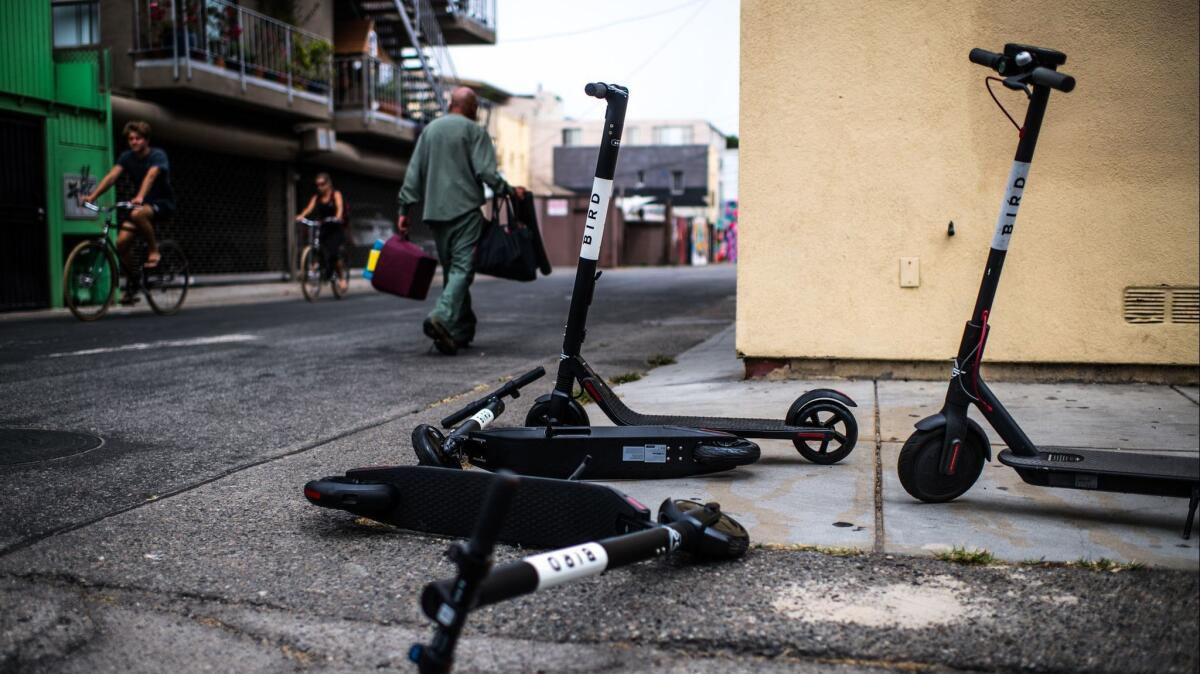L.A. Councilman Paul Koretz seeks a temporary ban on electric scooters

- Share via
The zippy electric scooters that have popped up on street corners and sidewalks across Southern California should be banned in Los Angeles until the city begins issuing permits to the companies providing them, a city councilman said Tuesday.
Councilman Paul Koretz’s motion tells city officials to take “all available measures” to ban the scooters in L.A. and instructs transportation officials to issue cease-and-desist letters to any company offering scooters for hire.
The motorized scooters, provided by companies such as Lime and Bird, have exploded in popularity since their arrival in Southern California last year. They typically cost $1 to rent plus 15 cents per minute, and can be picked up and left anywhere, rather than returned to a rack or station.
If the City Council approved the ban, each scooter company could secure the right to operate in Los Angeles by obtaining a permit, once applications are open. City officials are currently debating the rules that scooter companies would need to follow, and a decision is “a few months away,” Koretz said.
“Before we come up with regulations and enforcement — since I’ve seen none — it would be a good idea to stop and take a breath,” Koretz said.
David Estrada, Bird’s chief legal officer, said in a statement Tuesday that the company “will continue to work closely with policymakers to address safety concerns” as the city develops an “appropriate regulatory framework.”
Lime spokeswoman Mary Caroline Pruitt said the company supports “regulations that prioritize rider safety, while allowing Lime to continue to serve the community.”
Beverly Hills approved a six-month ban on scooters last week. Officials said the temporary restrictions were necessary while the city hammered out a policy with the scooter companies.
Koretz said he had seen hundreds of people on scooters riding on the sidewalk near his home in Beverly Grove without helmets, or with another person on board. He said he has grown more concerned about the risk of injury — and the risk of lawsuits against the city that could follow.
“If people wind up getting injured because of our lack of regulation, that’s on us, to some degree,” Koretz said. “They’re private companies, but they’re making use of the public right of way.”
Transportation advocates have encouraged city officials to quickly finish the permitting process, saying the motorized scooters are not only fun, but an important way for commuters to travel from work, home and transit stations in sprawling Los Angeles.
“These types of bike-shares and scooter-shares can have a role in transportation, but it’s important that the city has a means of regulating them, and that the terms of operation are clear,” said Colin Sweeney, a spokesman for San Fernando Valley Councilman Mitchell Englander, who seconded Koretz’s motion.
The City Council’s transportation committee approved tentative scooter guidelines in June. The rules still need approval from the public works committee and the full council.
The current proposal would initially limit each company to 5,000 scooters in L.A.: up to 2,500 anywhere in the city, and an additional 2,500 in economically disadvantaged areas.
The Transportation Department asked for discretion to raise or lower fleet sizes four times a year, depending on how closely the companies follow the rules, and how many daily riders are using each scooter, on average.
The companies would be required to provide a cash payment option and provide free half-hour rides to users whose incomes are less than double the federal poverty line: $24,280 for a one-person household, or $50,200 for a family of four.
To address complaints that the scooters block sidewalks, doorways and wheelchair ramps, the city has suggested restricting parking to the outer edge of the sidewalk, in the area shared with trash cans, bus shelters and parking meters. In-app directions could guide users to an appropriate spot, officials said.
From 7 a.m. to 10 p.m., including on weekends, the companies would have two hours to repair, remove or relocate any scooters that were broken or parked incorrectly. When the two-hour window closes, the scooters could be impounded by the Bureau of Sanitation, the city said.
Bird scooters removed from Newport Beach under threat of criminal prosecution »
For more transportation news, follow @laura_nelson on Twitter.
UPDATES:
9:40 p.m.: This article was updated with a statement from Lime’s spokewoman.
8 p.m.: This article was updated with a statement from Bird’s chief legal officer.
This article was originally published at 6:35 p.m.
More to Read
Sign up for Essential California
The most important California stories and recommendations in your inbox every morning.
You may occasionally receive promotional content from the Los Angeles Times.














